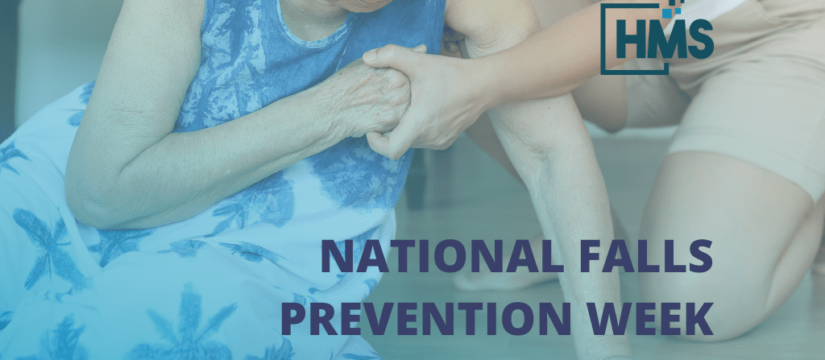
Fall Prevention Requires Your Full Attention
- September 20, 2021
- 0 Likes
- 1095 Views
- 0 Comments
Falling poses a huge risk for seniors and other vulnerable populations. Yet, of the one in four people aged 65+ who fall each year, less than half report it to their doctor. In honor of National Falls Prevention Week, Healthcare Management Solutions, LLC (HMS) wants to remove the stigma many seniors feel about falling, and provide some tips to help them, their families, and their caretakers prevent these dangerous accidents.
A lot of seniors don’t want to admit — to themselves or anyone else — that they’ve fallen, because they think it’s not a big deal, they’re embarrassed, or they don’t want to be seen as “old and feeble.” But statistics show that one of every five falls results in serious injury, such as a broken bone or head injury. And one fall nearly doubles the chances of an incident occurring again. So, a little slip or bump one day could be a sign of a more serious fall coming soon.
Fall Prevention Tips for Seniors:
- The saying “you’re only as old as you feel” may be true, but — honestly — you’ll feel a lot older a lot faster if you get injured in a fall!
- Talk with a doctor about medications that may be contributing to issues that affect your balance, ability to see, or your overall physical health.
- Have your eyes checked regularly to ensure that your vision will not create any additional risk of falling.
- Remove hazards from the home that may become obstacles. This may be a rug that could be tripped on, debris like boxes and garbage on the floor, furniture placed in high traffic areas, loose floorboards, cords on the ground, and many other potentially dangerous issues. It’s important to ensure that your home is safe to move around in and isn’t adding to the risk of a fall.
- Consider installing assistive devices in your home that make it easier to get around. These could include rails in your shower/bathtub, non-slip padding or carpet for bare wooden stairs, a raised toilet with armrests, and handrails.
- Participate in strength and agility training to help improve your mobility and decrease the likelihood of a fall. Regularly taking part in a gentle exercise routine will help keep you agile and in good shape.
Fall Prevention Tips for Families:
- Investing in the safety of everyone in your family is important, but especially so for ensuring that your most vulnerable family members — infants, toddlers, and elders — are protected from risks that particularly affect their age group.
- Make sure you address any physical barriers, repairs, or improvements needed to ensure safety, including proper lighting, and pay special attention to any spots in your home where someone could slip or trip. Do a hazard assessment both inside and outdoors, reviewing every room, every hallway, and every outside walkway. Any toys or tools lying around? Pop-up sprinklers or hidden holes in the yard? Stairways or rugs without non-skid padding?
- Remember: A three-year-old can typically fall and be fine, but that same fall for your 80-year-old grandma will likely mean a trip to the hospital for a broken hip. The older a person gets, the harder it is for them to heal. And a broken bone that renders them bed-ridden often leads to an overall health decline, with a very sad outcome.
Fall Prevention Tips for Caretakers:
- Here are some sobering facts from the Centers for Disease Control & Prevention (CDC) for you to remember as you care for an older person.
- Each year, 3 million older people are treated in emergency departments for fall injuries.
- Over 800,000 patients a year are hospitalized because of a fall injury, most often because of a head injury or hip fracture.
- Each year at least 300,000 older people are hospitalized for hip fractures.
- More than 95% of hip fractures are caused by falling, usually by falling sideways.
- Falls are the most common cause of traumatic brain injuries (TBI).
- Be sure you’re trained in the proper techniques for helping seniors navigate activities of daily living: getting into and out of bed, showering, toileting. You are their first line of defense against falling.
- Stay alert to a senior’s physical and mental condition, which can change from stable and vigorous one moment to frail, distracted, or even distressed minutes later.
- Always use proper personal protective equipment for yourself and the senior to avoid injuries. Depending on the person and other factors, you might need a harness, knee and/or elbow pads, hand and wrist protection. Be sure they are using the right type of walker, cane, or other assistive device for their condition and size.
- If the senior were to fall, do you alone have the physical strength to lift them, or would you need to call for assistance? If the latter, do you have an emergency plan for getting urgent aid?
HMS Is Committed to Fall Prevention
Much of our work at HMS is dedicated to conducting state and federal surveys that protect vulnerable populations and ensure they are receiving the best quality of care possible. Our work in surveying long-term care and other healthcare facilities all around the country, with highly trained survey teams focuses on safety protocols to ensure that vulnerable individuals do not suffer the consequences of a fall. HMS believes vulnerable individuals deserve to be treated with dignity and care. Preventing falls and ensuring the safety of older individuals is a crucial aspect of our mission.
More Resources

